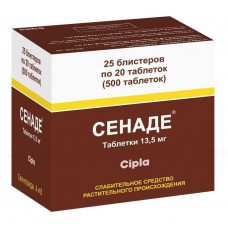Expiration date: 04/2026
Composition and form of release
Senade-tablets:
1 tab. contains Senna leaf extract 93.33 mg, with the content of sennosides A and B (in terms of sennosides B) 13.5 mg, 500 PCs per package.
Pharmacological action
Senade is a laxative of plant origin. Senna leaves contain dianthron glycosides (about 3%)-sennosides A, A1, B-G, a small amount of anthraquinone glycosides, including aloe-emodin and rein 8-glycosides, about 10% of mucus, flavonoids, including campherol derivatives, naphthalene glycosides.
Senade stimulates peristalsis of the colon, causes normal stools in 8-10 hours after administration. Selectively acts on the colon, restores normal intestinal function, does not cause addiction and does not affect digestion.
Indications
Constipation caused by hypotension and sluggish peristalsis of the colon. Regulation of the stool for hemorrhoids, proctitis, anal fissures, spastic and atonic constipation of various etiologies.
Contraindications
Intestinal obstruction, abdominal pain of unknown origin, violations of water and electrolyte metabolism, pinched hernia, acute inflammatory diseases of the abdominal cavity, peritonitis, bleeding from the gastrointestinal tract, uterine bleeding, cystitis, spastic constipation.
Use during pregnancy and lactation
Senade is used with caution during pregnancy and lactation.
Side effect
Possible: flatulence, colic-like abdominal pain.
With prolonged use, especially in high doses, - loss of electrolytes (mainly potassium), albuminuria and hematuria, deposition of melanin in the intestinal mucosa, damage to the intermuscular plexus.
Dosage and administration
Senade is taken inside in the evening after a meal. Adults and children over 12 years of age-before bedtime, depending on the dosage form, 1-2 tablets per day. The dose for children 1-6 years is 1/3, and for children 6-12 years - 1/2 dose of adults.
Storage conditions and shelf life
In a dry, protected from light place, at a temperature no higher than 20 °C. Shelf life-2 years.


